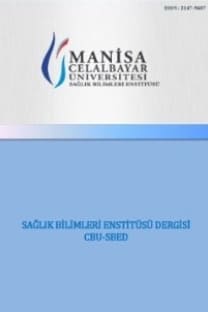Ulusal ve Uluslararası Ebelik Etik Kodları
___
World Health Organization, Maternal, newborn, child and adolescent health. http://www.who.int/en/, 2015 (erişim tarihi 22.04.2017).International Confederation of Midwives, International Definition of the Midwife. http://internationalmidwives.org/, 2017 (erişim tarihi 22.04.2017).
Güner S, Yurdakul M, Yetim N, Türkiye’de Ebelik Mesleğinin Sorunlarına Akademik Bakışı Yansıtan Nitel Bir Çalışma, Yükseköğretim ve Bilim Dergisi, 2015, 5(1), 80-7.
T.C. Sağlık Bakanlığı, Türkiye’de Sağlık Eğitimi ve Sağlık İnsangücü Durum Raporu-2014. file:///C:/Users/user/Downloads/_Ekutuphane_kitaplar_insa ngucu.pdf, 2014 (erişim tarihi 12.02.2017).
Organisation For Economic Co-operation and Development, Health Status. http://stats.oecd.org/index.aspx?DataSetCode=HEALTH_S TAT# , 2017 (erişim tarihi 04.04.2017).
Şencan İ, 2023 Yılı Sağlık İş Gücü Hedefleri ve Sağlık eğitimi. Basım: Ankara, 2014; pp 39-41.
Aktan, C.C, Işık, A.K, 21 Yüzyılda Herkes İçin Sağlık: 21 Hedef. http://www.canaktan.org/ekonomi/saglik-degisimcaginda/ pdf-aktan/herkes-icin.pdf, 2017 (erişim tarihi 22.04.2017).
Türk Ebeler Derneği, Dünya’da ve Türkiye’de Ebelik Tarihi. http://www.turkebelerdernegi.com/, 2017 (erişim tarihi: 22.04.2017).
Foster, I.R, Lasser, J, Professional Ethics in Midwifery Practice. Press: United States of America, 2011; p 1-16.
Ersoy, N. Ebelikte Meslek Etiğinin, Etik Değerlerinin Önemi ve Gereği, I. Uluslararası & II. Ulusal Ebelik Kongre Kitabı, Safranbolu, Türkiye, 2011.
Türk Dil Kurumu, Büyük Türk Sözlüğü. http://www.tdk.gov.tr/index.php?option=com_bts&view=bt s, 2017 (erişim tarihi: 14.03.2017).
Şenses, M.O. Ulusal Ebelik Etik Kodları Projesi, I. Uluslararası & II. Ulusal Ebelik Kongre Kitabı, Safranbolu, Türkiye, 2011.
Yıldırım G, Koçkanat P, Duran O, Ulusal Ebelik Kodları ve Meslek Değerleri, STED, 2014, 23(4), 148-54.
Ergin, A.B. Ebelikte Etik Değerler ve Bu Değerlerin Uluslararası Etik Değerlerle İlişkilendirilmesi, I. Uluslararası & II. Ulusal Ebelik Kongre Kitabı, Safranbolu, Türkiye, 2011.
International Confederation of Midwives, International confederation of midwives.ınternational code of ethics for midwives. http://internationalmidwives.org/assets/uploads/documents/ CoreDocuments/CD2008_001%20V2014%20ENG%20Inte rnational%20Code%20of%20Ethics%20for%20Midwives.p df, 2014 (erişim tarihi 21.03.2017).
Midwives Alliance North America, Standards and qualifications for the art and practice of midwifery. https://mana.org/pdfs/MANAStandardsQualificationsColor. pdf, 2005 (erişim tarihi 21.03.2017).
Amerıcan College Of Nurse-Mıdwıves, Code of ethics. http://www.midwife.org/ACNM/files/ACNMLibraryData/U PLOADFILENAME/000000000048/Code-of-Ethics.pdf, 2005 (erişim tarihi 21.03.2017).
National Association Of Certified Professional Midwives. Nacpm state chapter leadershıp guıdelınes of ethıcal conduct. http://nacpm.org/wp content/uploads/2016/06/Chapter-Ethics-Policy_FINAL-050115.pdf, 2016 (erişim tarihi 21.03.2017).
Denmark Midwife Association, Ethıcal guıdelınes for mıdwıves. http://www.jordemoderforeningen.dk/fileadmin/Fag___Forskning/Etiske_retningslinjer/Etiske_Retningslinjer_2010.pdf, 2010 (erişim tarihi 21.05.2017).
The Federation of Finnish Midwives, Midwifery professional mechanism and working principles. https://www.suomenkatiloliitto.fi/, 2004 (erişim tarihi 21.05.2017).
New Zealand College of Midwives, Philosophy and code of ethics. https://www.midwife.org.nz/quality-practice/philosophy-and-code-of-ethics, (erişim tarihi 21.05.2017).
Australian College of Midwiwes. Code of ethics for midwives in Australia, file:///C:/Documents%20and%20Settings/user/Belgelerim/Downloads/Nursing-and-Midwifery-Board---Codes-and-Guidelines---Code-of-ethics-for-midwives---August-2008%20(1).pdf, 2008 (erişim tarihi 21.03.2017).
- ISSN: 2147-9607
- Yayın Aralığı: Yılda 4 Sayı
- Başlangıç: 2014
- Yayıncı: Manisa Celal Bayar Üniversitesi Sağlık Bilimleri Enstitüsü
Çocuk Yoğun Bakım Ünitelerinde Hemşirelerin Kullandıkları Ağız Bakım Yöntemlerinin Belirlenmesi
EMRİYE HİLAL YAYAN, MEHMET EMİN DÜKEN
ULUSAL VE ULUSLARARASI EBELİK ETİK KODLARI
Seçil KÖKEN DURGUN, Selma ŞEN, Esra TAYHAN
Laktasyon Dönemindeki Kadınların Bel ve Boyun Ağrı Seviyelerinin İncelenmesi
Hicret TIRINK KAYACI, ZEYNEP HOŞBAY, MÜBERRA TANRIVERDİ
Nadire DAL, ALİ YAVUZ KARAHAN, İrem ŞENYUVA, SEVCAN SEVİMLİ, ŞEYMA ÇATALGÖL, ERCAN KAYDOK
Sürdürebilir Labaratuvar Güvenliği Kültürü
Hemşirelik ve Ebelik Öğrencilerinin Vajinusmusa ilişkin Bilgi ve Görüşleri
CENNET ŞAFAK ÖZTÜRK, AYTEN TAŞPINAR
Balıkesir Üniversitesi Tıp Fakültesi Dönem-II Öğrencilerinin Anatomi Eğitimini Değerlendirmeleri
Kolonoskopi Yapılacak Hastalarda Bağırsak Temizliğine Öz Etkililik Düzeylerinin Etkisi
